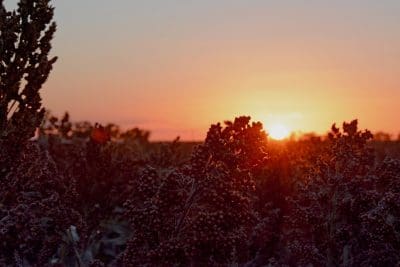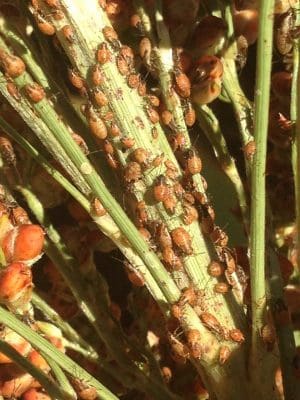RAIN forecast for parts of the summer cropping belt in NSW/Queensland over the next few days can’t come a moment too soon for struggling crops of sorghum, mung beans, sunflowers and dryland cotton.
A long, dry spell and a spate of heat waves have sapped the yield potential of any crops that haven’t been under the few patchy storms that have passed through this summer.
Hardest hit has been north-west NSW which continues to suffer through a record-breaking heatwave.
The town of Moree has sweltered through 27 consecutive days where the temperature has exceeded 35 degrees Celsius – a NSW record. The previous benchmark was 17 days, and there is no respite in sight with today’s maximum temperature heading for 39 degrees.
North-west NSW
Penberthy Ag Consultancy consultant, Drew Penberthy, Bellata, said sorghum crops three to four weeks off harvesting in north-west NSW were suffering from heat blasting and attack from insects, particularly Rutherglen bugs.
“There is not much sorghum in, but it is getting hammered. There has been a lot of spraying for bugs. The problem is you spray them and then they all come in on the next rain front and you have another population again,” he said.
“If we get rain, it will basically be too late for the sorghum, although it might help a bit with grain size.”
He said it was a similar story with the reduced planting of mungbeans in north-west NSW this year.
“They have been absolutely decimated with heat, Rutherglen bugs and mirids. It has been too hot for too long,” he said.
Mr Penberthy said the expanded area of dryland cotton this year was hanging on, but badly needed rain to counter the impact of the heat and insect pressure.
“The flowers are moving to the top of the bush really quickly because it has been so hot and there basically hasn’t been any rain since planting,” he said.
“The cotton has had a lot of damage from sucking insects where the crops are anywhere next to canola. The Rutherglen bugs gave it a real flogging early in the season. They have been through the crop the entire season. The combination of heat, lack of moisture and insects is doing damage.
“If it rains, it will help the cotton, but it needs to happen fairly quickly. We are on the cusp.”
Liverpool Plains
On the Liverpool Plains south-west of Tamworth, agronomist Pete McKenzie said substantial rain of 50 millimetres or more was needed to revive crops suffering from heat and moisture stress.
“The sorghum has lost a fair bit of yield in the last 10 days. Rain would be a big benefit on the early sorghum and later crops will need a fair bit of rain to get them through to the end,” he said.
“The sorghum area is back maybe by one-third on average in favour of cotton. The cotton area is up. There is the odd crop of mung beans and a very small area of sunflowers.”
Queensland
In Queensland, AgForce Grains president, Wayne Newton, said the sorghum area on the Darling Downs was well down, due to low sorghum prices and the attractiveness of dryland cotton.
“I suspect it could easily be back 30 to 40pc. The average yields are going to be well back as well. The crop will be well down on the crops we have grown in the last couple of years,” he said.
“The season has been very patchy. A few areas have been getting under a few opportune storms and have excellent crops.
“The sorghum that got the rain is looking excellent, the sorghum that missed out is looking very tired and beaten. There are a few crops that you can’t even see heads in. The current low prices make it very ordinary return-wise.”
Mr Newton said some of the cotton crops were holding up well and looked good.
“The cotton was probably planted on the better ground this summer just because the prospects were good for prices. Anything on good long fallow has hung in there but it is finishing up rapidly now. Anything that has had rain is still going quite well,” he said.
Mr Newton said the patchy rain meant only a limited area of mungbeans was planted on the Downs this season.
“Some of the later crops that got a bit of rain are looking really good, while there are people with seed sitting in the shed that didn’t plant and probably now won’t. There will be people sow for another 10 days, but time is rapidly running out,” he said.
As in NSW, insect pressure has been moderate to high in all summer crops in Queensland this season.
“Sorghum has been sprayed for heliothis and Rutherglen bugs. And, typically, you have to spray mung beans for sucking insects and grubs. The cotton has had steady with ongoing pressure on the conventional varieties, and even Bollgard has had sucking insect issues,” he said.
Mr Newton was critical of weather forecasts at the beginning of the summer cropping season that pointed to a wet summer.
“A lot of people have been disappointed with the weather forecasting this summer. We have been promised a lot and delivered very little,” he said.
“There have been a few times the Bureau has talked up the weather events. There is a high level of disappointment the season has turned out as it has, given that right back in the spring some of the earlier forecasts were for it to be a good summer. But it certainly hasn’t materialised.”
Mr Newton said there was not a lot of sorghum planted in Central Queensland yet as they were only coming into the planting window for main season sowings.
“The rain up there has been quite patchy. A few people have benefitted from some excellent storms. There are still large areas of the Highlands still not wet enough. They really haven’t got out of the starting blocks yet,” he said.
“There was very little summer crop in south-west Queensland. They didn’t get the rain at the suitable time to get going and there hasn’t been a good general rain for the summer planting of sorghum.”






HAVE YOUR SAY